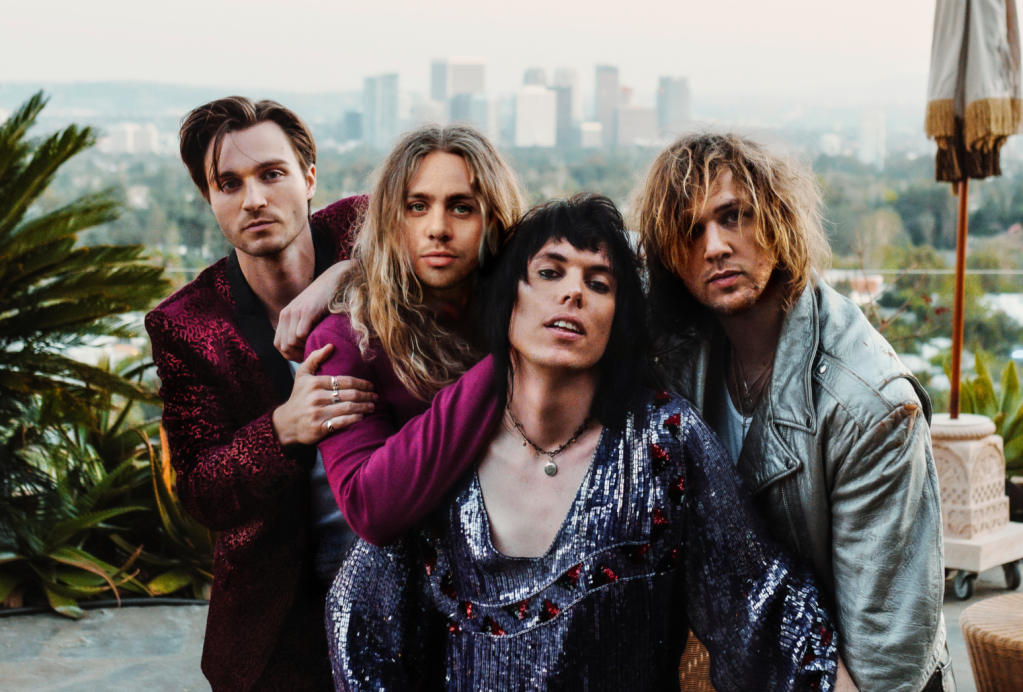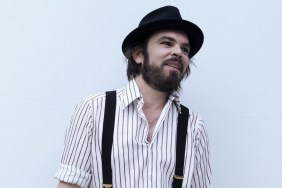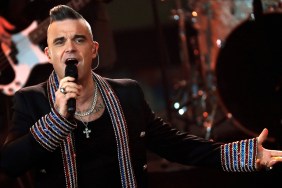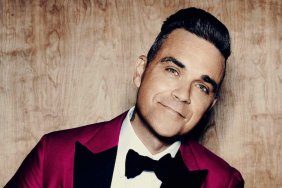Discretion is not a characteristic you’d typically associate with UK rock ‘n’ rollers The Struts. Although they hail from Derbyshire in the East Midlands of England, The Struts have always felt spiritually aligned with the iconic haunts along West Hollywood’s Sunset Strip – be it the Roxy, the Rainbow, the Viper Room or Whisky a Go-Go. Everything they do comes with a liberal dose of glamour and bravado, which has been the case since their debut album, Everybody Wants, came out in 2014.
But 2020 has a way of turning all preconceptions on their head. And so it was that in the early months of the pandemic, the foursome of singer Luke Spiller, guitarist Adam Slack, bass player Jed Elliott and drummer Gethin Davies started working on new music within the relatively low-key confines of producer Jon Levine’s LA home. The idea was to spend ten days cooped up together, chiefly as a means of warding off the inertia imposed by The Struts’ just-cancelled tour schedule.
The band didn’t tell their record label what they were up to – which, by the way, is Interscope, home to Billie Eilish and Tame Impala – and kept an open mind about the outcomes. The result? The Struts’ third studio record, Strange Days, which follows 2018’s YOUNG & DANGEROUS.
The new album includes guest appearances from Joe Elliott and Phil Collen of Def Leppard, Albert Hammond Jr. of The Strokes, RATM’s Tom Morello and one Robbie Williams. The lineup of guests is a good indication of what you’re getting with Strange Days, as The Struts place equal emphasis on classic rock riffs, pop hooks and indie rock aberrations.
Music Feeds spoke to Spiller about the record’s relatively modest creation story as well as its firmly immodest guest list and The Struts’ evolving artistic identity.
Music Feeds: Was the idea of writing your next album in this more traditional and condensed way – four guys living together, experimenting, recording as you went – already on the cards pre-coronavirus?
Luke Spiller: No, not whatsoever. So what happened is, I was really urged to make a real move to LA in January, so we ended up all relocating there officially in early 2020. And it was business as usual – we had a little tour, we were still recording demos for what would’ve been a follow up to YOUNG & DANGEROUS and then [because of] Corona, all of a sudden everything was just dipping. We had stuff being cancelled left, right and centre and before we knew it, Los Angeles went into this huge lockdown.
It was then put to us, “look, why don’t you go into the studio? You’re not doing anything, just go in and make something for your fans.” That was the nucleus of the entire idea and it wasn’t even an album – we were talking maybe three, four songs. And I just think with the expectation of being able to record in a way that we’ve always wanted to do, which is in a residential studio, one producer, no external people poking their noses in and messing with things – it was just us, the producer – we were so excited and I think that’s why it became so prolific.
MF: It’s a contrast to how you made YOUNG & DANGEROUS, which was very much a major label, shooting for the stars project, with stacks of different co-writers involved and recorded over a drawn-out period of time. Regaining that sort of independence, did you have any preconceived ideas of where you’d take the sound of The Struts on this album?
LS: Yes and no. We definitely wanted to try something that was a lot more true to how we are live, which is something that we’ve never really done. We’ve never been a band that has really had the time or the resources to do pre-production and rehearsals, for instance. So we had no idea how it was going to sound, but we knew that we wanted to do this.
Like everything, the entire record was just a very happy experiment, which proved to be extremely fruitful and nothing was too pre-conceived. It was just an amazing, magical moment in time where songs, sounds, energy, inspiration were literally just falling.
MF: At what point did you realise this wasn’t just a few songs for the fans, but a whole new album?
LS: The word “album” wasn’t even mentioned until we had done six or seven songs in the first four to five days. And we were like, “this is incredible.” This was us just throwing the kitchen sink at something and with a very, very devil may care attitude. We weren’t thinking about radio, the label didn’t even know we were up to this. We kept everything a giant secret and we self-funded it, completed it, brought all these friends in and then was like, “Hi, look what we’ve been doing. Do you like this?”
MF: One of those friends is Robbie Williams, who appears on the title track. The Struts are known for invoking a lot of glam and classic rock tropes, but you’ve never been a band for rock purists alone – there’s a very evident pop, anthemic element to what you do and before Robbie, you’d worked with Kesha. Were these conscious moves, to not simply cater to rock diehards?
LS: In some ways. Whenever it came to a decision regarding someone who we would like to bring in, these weren’t decisions that were made based on a business standpoint. These were genuine relationships that we had formed that felt natural to do so. Kesha, we all got on like a house on fire and it was just kind of like, “Why not?” Robbie Williams, same thing.
We’ve definitely been a group that never wants to give itself a ceiling, sonically, which I do feel a lot of our contemporaries, as good as they are, evidently do, whether it’s [for] their fanbase, ticket sales or whatever. When you’re writing music, I never want to be like, “We need to do something that is more The Struts,” because the concept of the group and its identity is only determined by our actions.
MF: Robbie Williams calls himself a big fan of The Struts and describes the experience of singing with you as like singing with a hero. Was there any hesitation about working with him?
LS: This is the thing, if we would’ve had lots of other people involved, if I’d have said, “I’m going to get Robbie Williams on a song,” first of all in America they would’ve been like, “Who the fuck is Robbie Williams?” Unlike the UK and Australia, he’s not that well known in the States. And let’s be completely real, it’s been a while since the days of ‘Let Me Entertain You’, ‘Rock DJ’, ‘Angels’ – the songs that I grew up in the UK knowing and loving. So some people would’ve been like, “Well, this doesn’t even make sense.”
But it proved to be really useful, because I love to write with an intention and when it came to Strange Days, I turned around and said to everyone, “We need to make a song because Robbie says he’s up for doing something. Let’s really push the boat out and let’s try and create something which has the reminiscence of the Robbie Williams that we all knew and loved and grew up with.”
MF: Was it the same approach with the other features on the record – Joe and Phil from Def Leppard, Albert from The Strokes and Tom Morello?
LS: ‘Wild Child’ for instance, as soon as it got to the pre-chorus, everyone was like, “This is very Tom. If he got on this song, he would be able to take everything up to the next level.” So it proves to be really productive when you write with a real vision. So I’m proud of them all and it was naturalistic and it was fun, above everything.
The Struts’ ‘Strange Days’ is out now via Interscope Records.
Listen now below.












